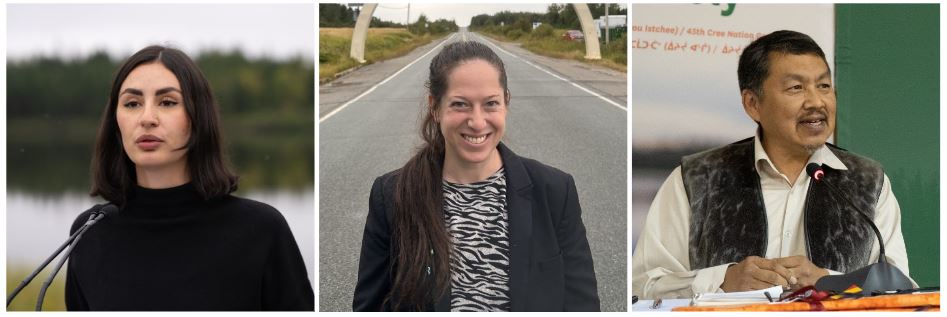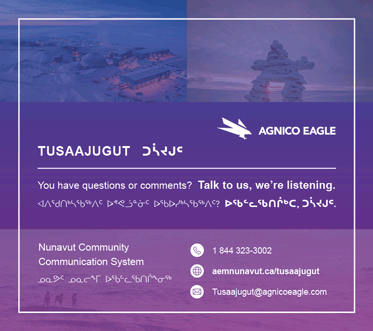Transportation, clean water at forefront of Ungava candidates debate
Three of five candidates, answered questions on topics related to the environment
Three of the five Ungava riding candidates — from left: Maïtée Labrecque-Saganash of Québec solidaire, Christine Moore of the Parti Québécois and Tunu Napartuk of the Liberal Party of Quebec — took part in a debate Wednesday night ahead of the Oct. 3 Quebec provincial election. (File photos)
With less than two weeks until election day in Quebec, three of the five candidates in Ungava riding discussed Nunavik-related issues such as transportation, clean drinking water and access to food in a two-hour debate Wednesday.
The three who took part were Christine Moore of the Parti Québécois — the only one to show up in person at the Centre D’Études Collégiales in Chibougamau — plus Québec solidaire candidate Maïtée Labrecque-Saganash and Liberal Tunu Napartuk, both of whom participated via Zoom. Conservative Nancy Lalancette and Coalition Avenir Québec’s Denis Lamothe, the riding’s incumbent MNA, did not attend.
The group Vire au vert organized the event as part of a series of debates provincewide on the environment ahead of voting day Oct. 3.
For the Ungava debate, it provided candidates the list of questions ahead of time.
All candidates spoke in French, but an English interpreter was part of the presentation online. The format didn’t allow for back-and-forth debate between candidates.
On transportation, they were asked what alternatives they propose to reduce emissions caused by automobiles and airplanes.
Moore highlighted her party’s proposal for provincewide one-dollar-per-day transit fees to make buses a more attractive way to travel in Quebec.
She also said the government should look into building roads and railways that extend into the far north of Quebec.
Napartuk and Labrecque-Saganash agreed on the need to reduce vehicle emissions, but both said building on the undisturbed land in the North would be expensive and possibly have negative impacts on wildlife.
“Food will be less expensive, perhaps, if it comes through a roadway, but it is a region that is very sensitive when the changes are so quick,” Napartuk said.
All three candidates shared their plans to improve reliable access to food in the North, where costs are high.
Napartuk and Labrecque-Saganash, who are both Indigenous, highlighted the need to protect wildlife populations and to provide the resources for hunters to survive off the land.
Moore said that while agriculture is less feasible in the North, Quebec should work with Nordic countries to learn how they grow food in cold environments, and develop greenhouse technologies that can work in the Arctic.
“I had a chance to visit some people in Iceland and there, fruits and vegetables are in the greenhouses locally,” Moore said.
“Northern agriculture is possible, it would be a better thing for food autonomy.”
Access to clean drinking water was a key issue in the second half of the debate.
All three candidates promised their party would take an active role in modernizing Nunavik’s truck-delivered water system.
After spending a few days in Kuujjuaq, Labrecque-Saganash highlighted the urgency of Nunavik’s water crisis, which she said is worsened in the winter when some communities’ pipes freeze and break down.
“Right here in Quebec, Inuit are completely neglected by the Government of Quebec, we need better infrastructure to have water in every house in Nunavik,” she said.
Last week, CAQ candidate Lamothe stepped away from his campaign to be with his terminally ill mother. Around the time of the debate Wednesday, he announced on his Facebook page that his mother had died Sunday, and that he would return to the campaign on Sept. 26.
Debate organizers said Conservative Lalancette did not respond to an invitation to participate.
Nunatsiaq News emailed Lalancette and a party spokesperson Monday to ask why she wasn’t going even though the debate was being held in her hometown, but did not receive a response.
Advance voting begins next week ahead of voting day on Oct. 3.
For information on how to vote, visit the Elections Quebec website. Elections Quebec also provides Inuktitut voting information.







Extending the QNS&L farther north to Ungava Bay perhaps, rail is heavy duty hauling, low maintenance, reliable, and it would help us to maintain better contact with the Naskapi.